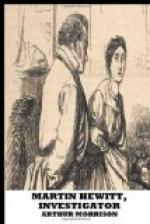“What shall you do?”
“Put the letter in the box with the casts for the police. Fiat justitia, you know, without any question of sentiment. As to the apple, I really think, if the police will let me, I’ll make you a present of it. Keep it somewhere as a souvenir of your absolute deficiency in reflective observation in this case, and look at it whenever you feel yourself growing dangerously conceited. It should cure you.”
* * * * *
This is the history of the withered and almost petrified half apple that stands in my cabinet among a number of flint implements and one or two rather fine old Roman vessels. Of Mr. Sidney Mason we never heard another word. The police did their best, but he had left not a track behind him. His rooms were left almost undisturbed, and he had gone without anything in the way of elaborate preparation for his journey, and without leaving a trace of his intentions.
IV.
THE CASE OF THE DIXON TORPEDO.
Hewitt was very apt, in conversation, to dwell upon the many curious chances and coincidences that he had observed, not only in connection with his own cases, but also in matters dealt with by the official police, with whom he was on terms of pretty regular, and, indeed, friendly, acquaintanceship. He has told me many an anecdote of singular happenings to Scotland Yard officials with whom he has exchanged experiences. Of Inspector Nettings, for instance, who spent many weary months in a search for a man wanted by the American Government, and in the end found, by the merest accident (a misdirected call), that the man had been lodging next door to himself the whole of the time; just as ignorant, of course, as was the inspector himself as to the enemy at the other side of the party-wall. Also of another inspector, whose name I can not recall, who, having been given rather meager and insufficient details of a man whom he anticipated having great difficulty in finding, went straight down the stairs of the office where he had received instructions, and actually fell over the man near the door, where he had stooped down to tie his shoe-lace! There were cases, too, in which, when a great and notorious crime had been committed, and various persons had been arrested on suspicion, some were found among them who had long been badly wanted for some other crime altogether. Many criminals had met their deserts by venturing out of their own particular line of crime into another; often a man who got into trouble over something comparatively small found himself in for a startlingly larger trouble, the result of some previous misdeed that otherwise would have gone unpunished. The ruble note-forger Mirsky might never have been handed over to the Russian authorities had he confined his genius to forgery alone. It was generally supposed at the time of his extradition that he had communicated with the Russian Embassy, with a view to giving himself up—a foolish proceeding on his part, it would seem, since his whereabouts, indeed even his identity as the forger, had not been suspected. He had communicated with the Russian Embassy, it is true, but for quite a different purpose, as Martin Hewitt well understood at the time. What that purpose was is now for the first time published.




